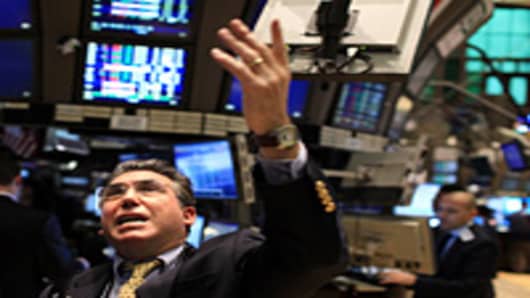Friday's better-than-expected jobs report provided a fairly stark example of what happens when good economic news can be bad for the stock market, and investors probably have the Federal Reserve to blame.
A government report showing the economy added 151,000 jobsnormally might be expected to send stock investors on a buying frenzy on the notion that the economy is getting better.
But with the job growth came confidence in the economy, and with confidence in the economy came a rush to the US dollar.
And that has been—since stocks began their recovery in March 2009—poison to the markets, no matter how good the economic data has been. Traders have liked a cheap greenback as it keeps dollar-denominated assets inexpensive and interest rates low, and Federal Reserve policies have been more than obliging.
"We got a small taste this morning of what good, positive economic data will do the dollar," says Quincy Krosby, market strategist at Prudential Financial in Newark, N.J. "If the data continues to get better, you should see the dollar strengthen. The question is, How does the market handle that?"
The answer is not well, especially compared to expectations.
Despite the strong jobs news, the market is still relying on the Federal Reserve, which helped send all assets soaring Wednesday, the day after the central bank pledged to embark on another $600 billion money-printing program to stimulate the economy through Treasury purchases.
Economic news has been better this week, but is playing only a secondary role amid the market's Fed dependence.
"The market is seeing that money is free, that interest rates are going to remain low for a very, very long time. They are seeing the fact the dollar is going to be trashed," says Michael Pento, senior economist at Euro Pacific in New York. "This is a very temporary, false, ersatz prosperity and what happens on the other side of this wall is going to be very devastating for our country."
But investors seem more comfortable betting on a weak dollar than a strong economy.
Economists polled by Thomson Reuters had expected a net gain of about 60,000 jobs for October. On the strength of growth in service-related industries, the number easily beat that estimate and was just above the 150,000 level that economists generally consider necessary to bring down the unemployment rate.
The dollar had been bid up against a basket of foreign currencies prior to the release of the jobs number and held its gains through the trading session.
Amid the currency action and economic developments, the stock market did little, with the major averages either slightly negative or around breakeven.
In fact, the only thing keeping the market afloat was the financial sector, which gained as much as 2.2 percent and comprises 15.6 percent of the S&P 500, second only to information technology among the 10 sectors in the index.
Investors clearly haven't adjusted yet to the notion of a stronger dollar, which in good economic times accompanies a market move higher.
"In a perfect world, the market accepts a solid currency, not one that is falling and falling and falling. We don't live in a perfect world," Krosby says. "What you hope for is the market reaches an equilibrium where it can accept a strong currency and your companies that do well on fundamentals continue to do well."
The Fed, then, remains in a precarious position, needing to devise an exit strategy or risk runaway inflation while also under the burden of a market that expects it to keep money cheap for at least the next eight months and likely quite a bit longer than that.
Stocks have been on a steady climb since Fed Chairman Ben Bernanke signaled in August another round of Treasury buying, a program often referred to as quantitative easing, or QE.
"The economic data is maybe 30 percent and the Fed is 70 percent," says Ryan Detrick, senior analyst at Schaeffer's Investment Research in Cincinnati. "Since Jackson Hole, when Bernanke said QE2 is coming, that clearly seems to be what's moving us. The market likes it."
To be sure, Friday's market slowdown probably reflected at least in some part a breather from the previous day's aggressive rally. Technicians also noted that the S&P 500 was around its April highs and will need an additional catalyst to break through.
And some analysts were parsing through the jobs reportand noting weaknesses—the lack of manufacturing-sector growth, a drop in the breadth of job creation, and the stubbornly high 17 percent of unemployed when including those no longer looking for work.
"The equity markets are running on fumes right now; extremely overbought and sentiment near extreme levels," David Rosenberg, economist and strategist at Gluskin Sheff in Toronto, said in his morning note. "The only correlation that counts is the U.S. dollar. Nothing now says that the equity market can’t go higher still, as it did during the 'don't-fight-the-Fed' days in the fall of 2007—but what a dangerous market that proved to be."



